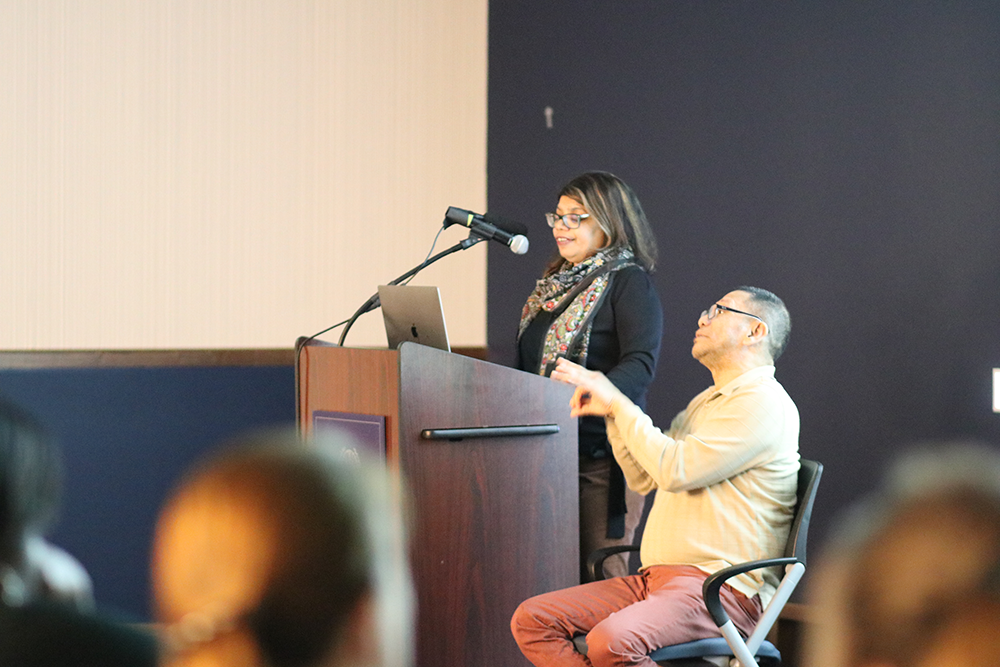Environmental injustice and disasters are linked to issues surrounding disability, poverty and racism, University of Alabama social and cultural studies professor Nirmala Erevelles said at an event Nov. 13.
The event “Disability, Eco(in)justice and Transnational Solidarity,” was sponsored by the disability studies program, the South Asian Society and Rangila, an annual, student-run philanthropic showcase of South Asian dance. Erevelles focused on how ecological injustice creates barriers for marginalized groups, citing environmental crises in Bhopal, India and Flint, Mich.

An act of negligence led to a gas leak at the Union Carbide pesticide plant in Bhopal in 1984 that exposed 600,000 residents to 30 tons of toxic and poisonous gas. The pesticide plant accident, caused by water entering a tank of toxic methyl isocyanate, caused the deaths of between 3,800 to 16,000 residents, according to The Atlantic.
The pesticide plant accident disproportionately affected impoverished citizens in Bhopal who were forced to live in affordable housing made cheaper by its proximity to the plant, according to Erevelles.
“Because Bhopal in India was promising jobs, there were a lot of people who migrated from the rural areas into the city and because they couldn’t afford housing in the big city, they built these little shantytowns across from the plant,” Erevelles said. “On the day when the gases escaped from the plant, people were dying in the space because many of them lived outside.”
The incident in Bhopal demonstrates how social and historical context in environmental crises can cause marginalized community members to become disabled, according to Erevelles.
“Where here you don’t get just born with a disability, you could become disabled within certain violent historical, social and political conditions,” Erevelles said. “You’re not just born disabled, you can become disabled because of this kind of environmental injustice.”
The water crisis in Flint, Mich. parallels the situation in Bhopal, India, according to Erevelles. In 2014, the city of Flint switched its municipal water source to a pipeline connected to the Flint River in order to cut costs for the town. After the pipeline switch, residents reported changes in water color and smell. In 2015, the water in Flint was tested and found to contain dangerous levels of lead, among other possible contaminants.
Governmental negligence in addressing the Flint water crisis in a timely manner has led to numerous negative health outcomes, according to Erevelles.
“It can cause health problems, it can decrease bone and muscle growth, poor muscle coordination, damage to the nervous system, kidneys or hearing, speech and language problems, developmental delays, seizures and unconsciousness in cases of extremely high lead levels and behavioral challenges,” Erevelles said.
The Flint water crisis has been unresolved for four years, leading to criticism of the government’s slow response. Reluctance to aid the people of Flint, nearly half of whom are black, is largely because of a lack of value placed on black lives, according to Erevelles.
“Vulnerable bodies are devalued,” Erevelles said. “An invulnerable body, we presume, produces profit. A vulnerable body sucks profit from spaces.”
To address conversation surrounding disabilities on campus, Georgetown University approved the disability studies minor in 2017, after three years of advocacy by the Disability Studies Minor Working Group. The minor focuses on the intersectionality between disability, philosophy and women’s and gender studies, among other disciplines.
Georgetown can better understand the connection between disability and environmental injustice through collaborations between the disability studies program and sustainability student organizations, according to event attendee and disability studies professor Libbie Rifkin.
“I think that, among other things, there should be more collaboration between disability studies and climate justice initiatives on campus,” Rifkin said in an interview with The Hoya. “There’s great work to be done and I know a lot of students are really interested in climate change. I think it’s important to bring disability into the conversation.”
Providing equitable access to education to marginalized and impoverished communities is crucial in improving accessibility, according to Erevelles.
“Education should be a space where people are nurtured to be the best they can be on their terms, not on standards,” Erevelles said.




















